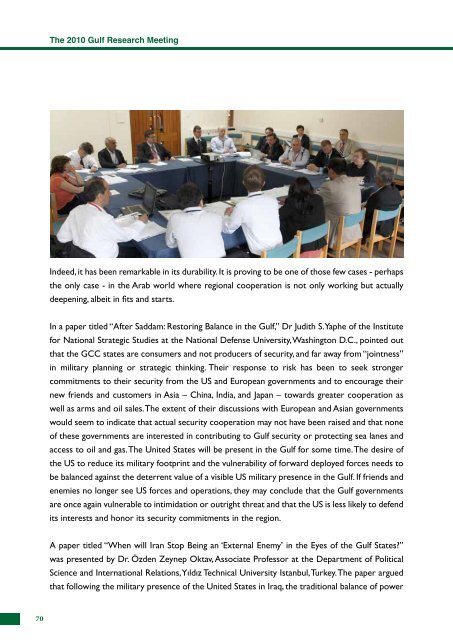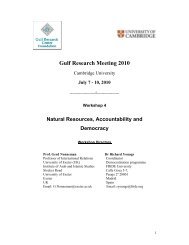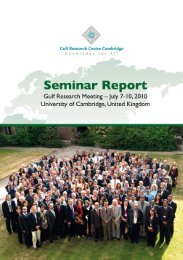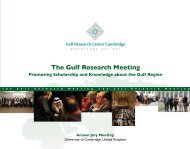GRM 2010 Report - Centre of Islamic Studies - University of ...
GRM 2010 Report - Centre of Islamic Studies - University of ...
GRM 2010 Report - Centre of Islamic Studies - University of ...
Create successful ePaper yourself
Turn your PDF publications into a flip-book with our unique Google optimized e-Paper software.
70<br />
The <strong>2010</strong> Gulf Research Meeting<br />
Indeed, it has been remarkable in its durability. It is proving to be one <strong>of</strong> those few cases - perhaps<br />
the only case - in the Arab world where regional cooperation is not only working but actually<br />
deepening, albeit in fits and starts.<br />
In a paper titled “After Saddam: Restoring Balance in the Gulf,” Dr Judith S. Yaphe <strong>of</strong> the Institute<br />
for National Strategic <strong>Studies</strong> at the National Defense <strong>University</strong>, Washington D.C., pointed out<br />
that the GCC states are consumers and not producers <strong>of</strong> security, and far away from “jointness”<br />
in military planning or strategic thinking. Their response to risk has been to seek stronger<br />
commitments to their security from the US and European governments and to encourage their<br />
new friends and customers in Asia – China, India, and Japan – towards greater cooperation as<br />
well as arms and oil sales. The extent <strong>of</strong> their discussions with European and Asian governments<br />
would seem to indicate that actual security cooperation may not have been raised and that none<br />
<strong>of</strong> these governments are interested in contributing to Gulf security or protecting sea lanes and<br />
access to oil and gas. The United States will be present in the Gulf for some time. The desire <strong>of</strong><br />
the US to reduce its military footprint and the vulnerability <strong>of</strong> forward deployed forces needs to<br />
be balanced against the deterrent value <strong>of</strong> a visible US military presence in the Gulf. If friends and<br />
enemies no longer see US forces and operations, they may conclude that the Gulf governments<br />
are once again vulnerable to intimidation or outright threat and that the US is less likely to defend<br />
its interests and honor its security commitments in the region.<br />
A paper titled “When will Iran Stop Being an ‘External Enemy’ in the Eyes <strong>of</strong> the Gulf States?”<br />
was presented by Dr. Özden Zeynep Oktav, Associate Pr<strong>of</strong>essor at the Department <strong>of</strong> Political<br />
Science and International Relations, Yıldız Technical <strong>University</strong> Istanbul, Turkey. The paper argued<br />
that following the military presence <strong>of</strong> the United States in Iraq, the traditional balance <strong>of</strong> power





